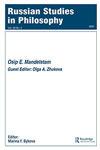Variants of Images of the Future in the Work of Lev P. Karsavin
IF 0.1
4区 哲学
Q4 Arts and Humanities
引用次数: 0
Abstract
ABSTRACT This article examines the evolution of Lev P. Karsavin, the connection between the philosopher’s historical perspective and his ontological constructions, his postulation of the personhood principle of being’s organization, and the common mindsets of the philosophy of all-unity. The author of this article distinguishes between reflections on the future found in Karsavin’s pre-emigration work and the image of the future he creates within the framework of the Eurasianist paradigm. This article presents three variants of representation of the future: the universal, the national-cultural, and the state. The author analyzes the image of the future associated with the coming-to-be of the All-One Humanity, its transformation into a truly symphonic person, and show how this image turns into a concept of the future that affirms the self-development of national culture. The prospect of developing Russia-Eurasia as an ideocratic and statist state that acts as a form of manifestation of the national culture represents the final stage of this evolution.Lev P.Karsavin作品中的未来图像变体
摘要本文考察了列夫·卡尔萨文的进化历程,这位哲学家的历史视角与本体论建构之间的联系,他对存在组织的人格原则的假设,以及一切统一哲学的共同心态。本文的作者区分了卡尔萨文移民前作品中对未来的思考和他在欧亚主义范式框架内创造的未来形象。本文提出了未来表征的三种变体:普遍性、民族文化和国家。作者分析了与全人类的到来及其向真正交响乐人的转变相关的未来形象,并展示了这一形象如何转变为一种肯定民族文化自我发展的未来概念。俄罗斯-欧亚大陆发展成为一个意识形态和国家主义国家的前景,作为民族文化的一种表现形式,代表了这一演变的最后阶段。
本文章由计算机程序翻译,如有差异,请以英文原文为准。
求助全文
约1分钟内获得全文
求助全文
来源期刊

RUSSIAN STUDIES IN PHILOSOPHY
PHILOSOPHY-
CiteScore
0.10
自引率
0.00%
发文量
14
期刊介绍:
Russian Studies in Philosophy publishes thematic issues featuring selected scholarly papers from conferences and joint research projects as well as from the leading Russian-language journals in philosophy. Thematic coverage ranges over significant theoretical topics as well as topics in the history of philosophy, both European and Russian, including issues focused on institutions, schools, and figures such as Bakhtin, Fedorov, Leontev, Losev, Rozanov, Solovev, and Zinovev.
 求助内容:
求助内容: 应助结果提醒方式:
应助结果提醒方式:


